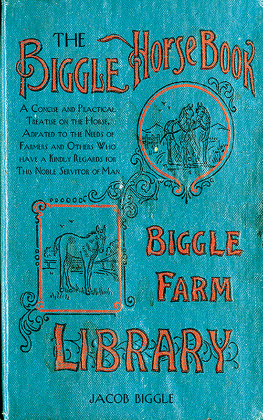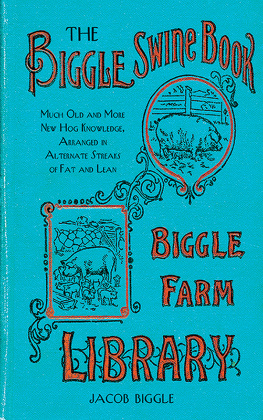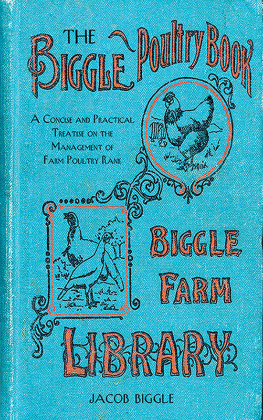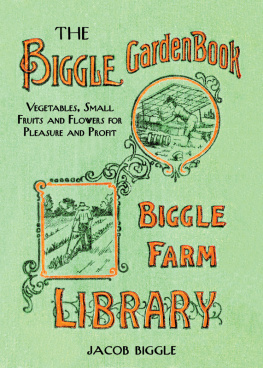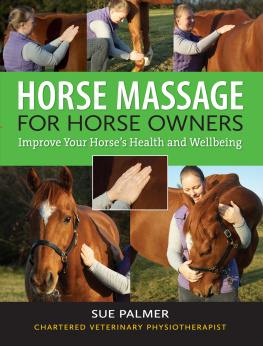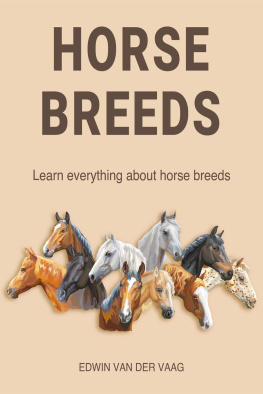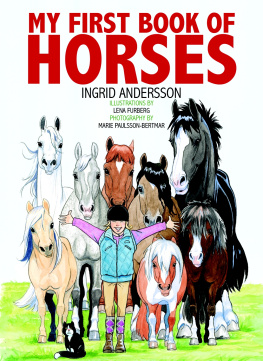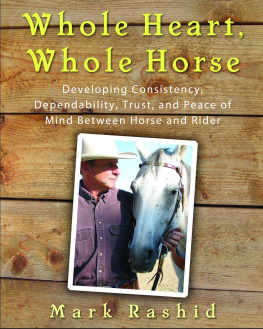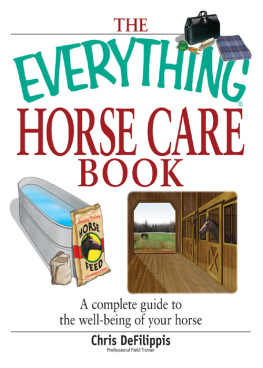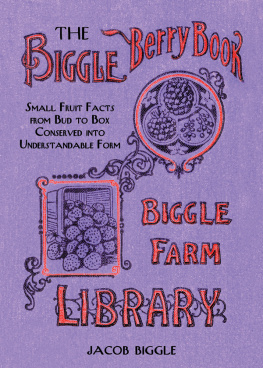

A CONCISE AND PRACTICAL TREATISE ON
THE HORSE
BY JACOB BIGGLE
ADAPTED TO THE NEEDS OF FARMERS AND OTHERS
WHO HAVE A KINDLY REGARD FOR THIS
NOBLE SERVITOR OF MAN
ILLUSTRATED
"Always speak to a horse as you would to a gentleman."

Skyhorse Publishing
Copyright 2013 by Skyhorse Publishing
All Rights Reserved. No part of this book may be reproduced in any manner without the express written consent of the publisher, except in the case of brief excerpts in critical reviews or articles. All inquiries should be addressed to Skyhorse Publishing, 307 West 36th Street, 11th Floor, New York, NY 10018.
Skyhorse Publishing books may be purchased in bulk at special discounts for sales promotion, corporate gifts, fund-raising, or educational purposes. Special editions can also be created to specifications. For details, contact the Special Sales Department, Skyhorse Publishing, 307 West 36th Street, 11th Floor, New York, NY 10018 or info@skyhorsepublishing.com.
Skyhorse and Skyhorse Publishing are registered trademarks of Skyhorse Publishing, Inc., a Delaware corporation.
Visit our website at www.skyhorsepublishing.com.
10 9 8 7 6 5 4 3 2 1
Library of Congress Cataloging-in-Publication Data is available on file. ISBN: 978-1-62636-145-4
Printed in China
PREFACE.
The Author has not much to say by way of Preface. A portion of the material contained herein has been contributed by practical Horsemen and Veterinarians of the highest standing in the United States. It contains much of the kindly wisdom of John Tucker and the gentle thought of Harriet Biggie as they have been displayed in the pages of the Farm Journal. Much space has been given to the humane Training of the Horse, to his proper Housing and Feeding, to the Care of his Feet, and to the Education of the Colt. The Author is fully conscious of the incompleteness of the work, of its imperfections and omissions; but he has done the best he could in the space allotted, and hopes his book will be of permanent value to all into whose possession it may come.
J ACOB B IGGLE .
E LMWOOD F ARM.
INVOCATION.
When cold and wet, please rub me dry,
And do not beat me when I shy;
Give twice a week a hot bran mash,
With corn and oats and salt a dash;
Ten pounds each day of hay thats free
From dustall you should give to me;

Feed twice a week, instead of oats,
A pair of carrotstwill shine my coat;
When hot, dont give me drink or grain;
When cold, dont stand me in the rain;
Batten my stable warm and tight,
And see that its kept clean and light;
In winter, blanket close and bed me deep;
And youll find Ill pay you for my keep.
CONTENTS.

HISTORY.
In all authentic history of the human race, we find the horse mentioned as the servant and companion of man.
When the horse was first domesticated is not known, nor do we know of what country he is a native. Central Asia, Arabia and Central Africa each claims this honor, and we will not dispute the claims of either.
In the time of Moses, horses were used in Egypt; and later on, Solomon kept and used large numbers of them. From Jobs vivid description it is evident that they were used and well bred in the countries farther east. Horses are represented in the carvings on the ruins of ancient Ninevah and in the marble friezes of the Greek Parthenon. When the Romans invaded Britain, they found the natives using horses of superior quality, and took some of them back to Rome.
It is supposed that the Spaniards brought horses to South America as early as 1535? and that soon afterwards others were shipped to Paraguay. From these importations, it is thought there resulted the countless herds that have since spread over South America, and, passing the Isthmus of Panama, wandered into Mexico and California. In like manner, European settlers carried this noble animal to Australia, where, as in America, he has multiplied to a prodigious extent. He has, indeed, been diffused by the agency of man throughout the whole inhabited globe.

REFERENCE CHART.
0. Poll or nape of the neck.
1. Neck.
1. Jugular gutter.
2. Withers.
3. Back.
4. Loins.
5. Croup.
6. Tail.
7. Parotid region.
8. Throat.
9. Shoulder.
10. Point of the shoulder.
11. Arm.
12. Elbow.
13. Forearm.
14. Chestnut.
15. Knee.
16. Canon.
17. Fetlock.
18. Pastern.
19. Coronet.
20. Foot.
21. Xiphoid region.
22. Ribs.
23. Abdomen.
24. Flank.
25. Sheath.
26. Testicles.
27. Buttock.
27 bis. Angle of buttock.
28. Thigh.
28 bis. Haunch.
29. Stifle.
30. Leg.
31. Hock.
32. Chestnut.
33. Canon.
34. Fetlock.
35. Pastern.
36. Coronet.
37. Foot.
HORSE MAXIMS.
J OHN T UCKER says:
Proper food and lots of sentiment will make with good blood a good horse.
The brush will save oats.
There is a great deal of saving in a walk.
It is all right to feed the horse hay only twice a day and the most at night.
Find some way of keeping the horses busy all winter. Thus only will they keep sound and be ready for hard spring work when it comes.
It is expensive to warm ice-water inside the stock.
Horses eat dirt and gnaw their mangers front habit and because they want to.
Ask the horses if they cant help out the hay mow by eating the straw sprinkled with bran.
If you must put frosty bits in some mouths, let it be your own. Suffering begets sympathy.
H ARRIET B IGGLE says:
There are oats in the currycomb.
There is more profit in coaxing than in kicks..
Do not push the plow team the first week or you may get behind.
If they throw up their heads and act timidly look after your stableman. Such acts speak louder than words.
Carry the bridles with you to the house when you go to breakfast and put the bits near the stove while you eat.
Be gentle, be kind, be patient.
Always speak to a horse as you would to a gentleman.
A horse can travel safer and better with his head hanging down or free than it can when it is checked up. By all means, let your horse have its head.
The three greatest enemies of the horse are idleness, fat and a dumb blacksmith.
Did you ever think of it? The whip is the parent of stubbornness. It is sure to be found somewhere in the pedigree of every balky horse. In training a young horse, use as intelligent brain instead of a cruel whip.
Many a horse stands up all night because its stall is not made comfortable to lie down in
Next page
